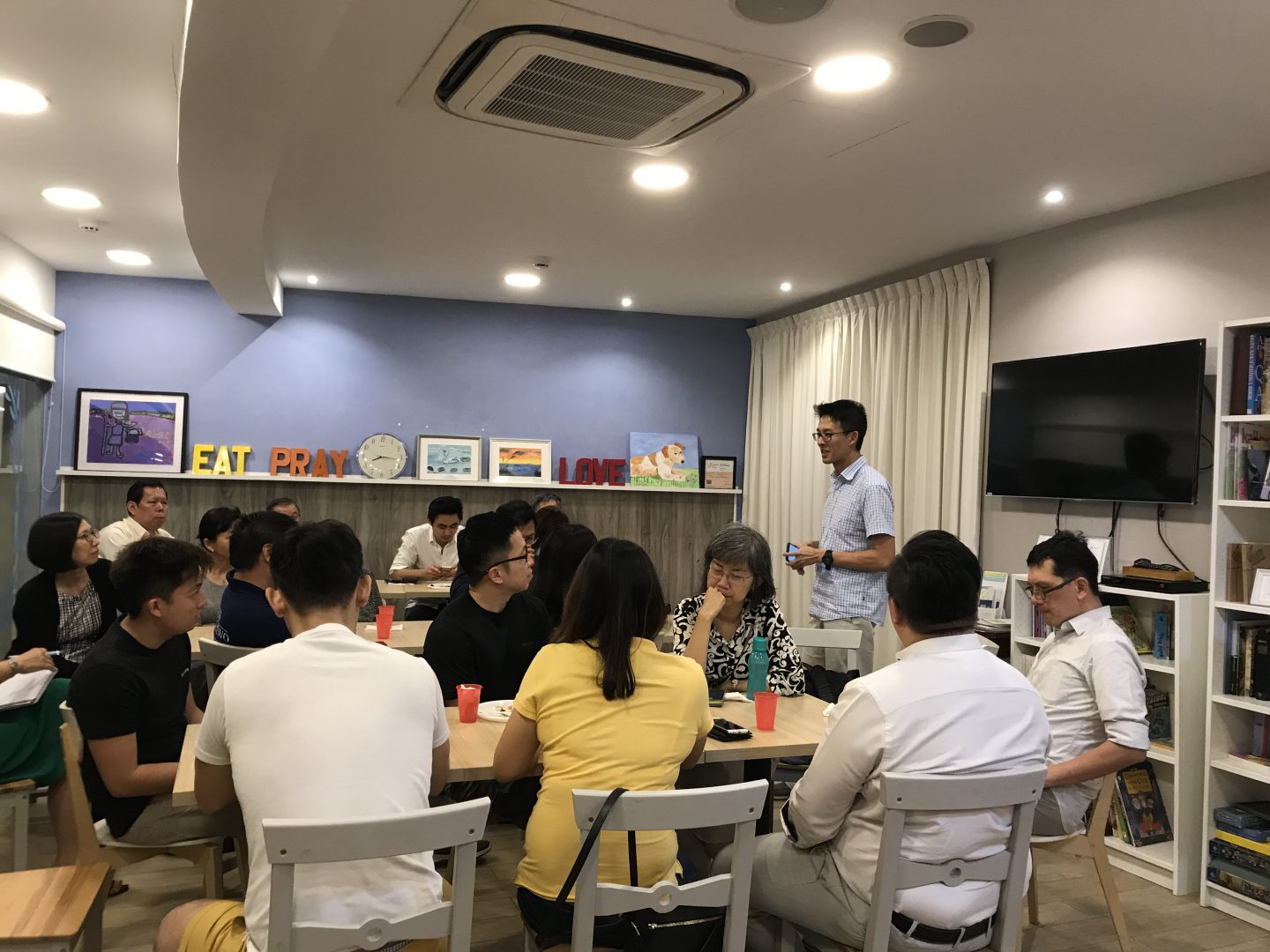“What if we all saw ourselves as ministers?”: Lausanne Movement’s Global Workplace Forum inspires fresh mindset
by Rachel Phua // August 7, 2019, 4:00 pm

"Can the church flourish outside the sanctuary?" Insights from this year's Lausanne Movement's Global Workplace Forum were presented by the Singaporean delegates to discuss how to equip the marketplace for the Holy Spirit's movement. Photo by Rachel Phua.
On a recent, breezy Thursday evening, close to 20 Christians gathered at Zion Bishan Bible-Presbyterian Church to discuss the hot topic amongst them: Marketplace ministry.
Some of them had just returned from the Lausanne Movement’s Global Workplace Forum (GWF) in Manila. They were small business owners, corporate executives, theology students and one housewife.
Inside the church’s brightly lit, pastel-themed café, each of them took turns to share their experience attending the conference.
Everyone expressed awe and appreciation for the sense of being acknowledged. Like-minded Christian working professionals met with their international counterparts.
What would happen if everyone saw themselves as ministers and sermons were given and discussed over lunchtime?
Michael Oh, the chief executive of the Lausanne Movement and former missionary to Japan, addressed the crowd, apologising that the clergy had paid insufficient attention to the needs of secular society.
Reuben Ang, the managing director of catering business Hesed and Emet, and the youngest delegate from Singapore, called the forum a “homecoming”.
“Business as missions always felt like a minority here,” he said. But inside the halls of Greenhills Christian Fellowship, where the forum was held, “everybody was on the same page”.
Another delegate, Shirley Ho, was asked to share her responsibilities as a homemaker, a role often neglected by man but not God.
She was timid at first, given many of the women at the conference were corporate and ministry honchos, she said. But after her speech, people came up to offer gratitude, and men told her they felt even more appreciative of their wives after hearing what she said.
Applying the Bible to the workplace
After all the delegates spoke, it was time for Timothy Liu, the chair of the Singapore GWF chapter and the Lausanne Catalyst for Workplace Ministry, to give a summary of what took place in Manila.
The forum was the first of its kind in Lausanne’s history in terms of its diversity, he reported. There were 850 participants representing 109 countries, 65% of them from a non faith-based organisation.
Both women and participants under the age of 40 each made up 35% of the delegates.
Instead of focusing on the typical workplace, the forum had discussions on domestic unpaid work, dangerous jobs and modern-day slavery.
Instead of just focusing on the typical workplace or on entrepreneurship, the forum had discussions on domestic unpaid work, dangerous jobs and modern-day slavery.
“We wanted to understand how the theology of work and the Bible applies to this context of workplaces who are typically not involved in any workplace forums,” said Liu, whose day job involves running Dover Park Hospice as its chief executive.
“We need to bring this message back to our churches,” he added, in a way that pastors would be spurred to teach their congregation how to love God “with all our heart, mind, soul and strength” (Matthew 22:37) in all public arenas.
The discussion turned to how to help pastors accept a new Church model, where its activities are democratised.
What would happen if people stopped attending their weekend church services because everyone saw themselves as ministers and sermons were given and discussed over lunchtime, the group mused.
Are we ready?
After referring to the Charismatic movement in the 1970s, which produced numerous new believers in Singapore, Timothy Wong, a banker with DBS Bank, posed this question aloud: “If tomorrow, Singapore’s Christian population went from 20% to 40%, because of the sovereign move of God … will we be ready?”
“If tomorrow, Singapore’s Christian population went from 20% to 40%, because of the sovereign move of God … will we be ready?”
The current method of conversion and discipleship doesn’t work, Wong said.
If someone suddenly turned up to say they wanted to become a Christian, the likely response would be to ask them to go to church on Sundays, attend baptism classes, get baptised and then go to Sunday school – “by that time, the whole thing is dead”.
Liu responded by likening the evolving Church structure to the marketing concept of a product life cycle.
Those who are involved in cultivating marketplace ministries should reach out to pastors who are “early adopters” and build prototypes that would reassure full-time ministry leaders that the Church can flourish outside of the sanctuary.
As the two-hour discussion came to the end, Liu, happy with the enthusiasm from the group, delivered a word of caution about straying too far from convention.
“The only thing we have to be careful of is if we have too many of these small, little groups. Then theologically we need to find ways to connect people so that we don’t run too far away from the core Gospel.”
We are an independent, non-profit organisation that relies on the generosity of our readers, such as yourself, to continue serving the kingdom. Every dollar donated goes directly back into our editorial coverage.
Would you consider partnering with us in our kingdom work by supporting us financially, either as a one-off donation, or a recurring pledge?
Support Salt&Light



